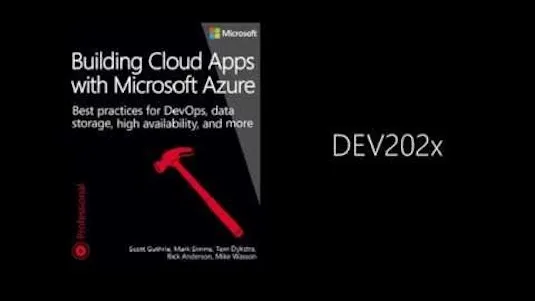
Building Cloud Apps with Microsoft Azure - Part 3 
This course provides an in-depth look at building cloud applications with Microsoft Azure. It covers patterns-based approaches to development, architecture, and coding practices. Through concrete examples, students will learn how to create real-world cloud solutions. They will also gain an understanding of the tools and techniques needed to build and deploy cloud applications. ▼
ADVERTISEMENT
Course Feature
![]() Cost:
Cost:
Free
![]() Provider:
Provider:
Edx
![]() Certificate:
Certificate:
No Information
![]() Language:
Language:
English
![]() Start Date:
Start Date:
16th Jun, 2015
Course Overview
❗The content presented here is sourced directly from Edx platform. For comprehensive course details, including enrollment information, simply click on the 'Go to class' link on our website.
Updated in [March 06th, 2023]
This course, Building Cloud Apps with Microsoft Azure - Part 3, will provide an overview of patterns-based approaches to building real-world cloud solutions. Participants will learn about monitoring, telemetry, and designing apps to survive failure. The concepts will be illustrated with concrete examples and links to additional resources. This is part three of a three-course series. Participants are encouraged to send their questions to [email protected] to help fine-tune the course content.
[Applications]
Upon completion of this course, learners are encouraged to apply the concepts and patterns learned to their own cloud development projects. Learners should also take advantage of the additional resources provided in the course to further their understanding of cloud development. Additionally, learners should consider joining the Microsoft Azure Developer Community to stay up to date on the latest Azure news and to connect with other developers.
[Career Paths]
1. Cloud Solutions Architect: Cloud Solutions Architects are responsible for designing, developing, and managing cloud-based solutions for their organization. They must have a deep understanding of cloud computing technologies, such as Microsoft Azure, and be able to develop and implement strategies for cloud-based solutions. As cloud computing continues to grow in popularity, the demand for Cloud Solutions Architects is expected to increase.
2. Cloud Developer: Cloud Developers are responsible for developing applications and services that run on cloud-based platforms, such as Microsoft Azure. They must have a deep understanding of cloud computing technologies and be able to develop and implement strategies for cloud-based solutions. As cloud computing continues to grow in popularity, the demand for Cloud Developers is expected to increase.
3. Cloud Security Engineer: Cloud Security Engineers are responsible for designing, developing, and managing security solutions for cloud-based systems. They must have a deep understanding of cloud computing technologies, such as Microsoft Azure, and be able to develop and implement strategies for cloud-based security solutions. As cloud computing continues to grow in popularity, the demand for Cloud Security Engineers is expected to increase.
4. Cloud Infrastructure Engineer: Cloud Infrastructure Engineers are responsible for designing, developing, and managing cloud-based infrastructure solutions. They must have a deep understanding of cloud computing technologies, such as Microsoft Azure, and be able to develop and implement strategies for cloud-based infrastructure solutions. As cloud computing continues to grow in popularity, the demand for Cloud Infrastructure Engineers is expected to increase.
[Education Paths]
Recommended Degree Paths:
1. Bachelor of Science in Computer Science: This degree path provides students with a comprehensive understanding of computer science fundamentals, including programming, software engineering, and computer architecture. It also covers topics such as artificial intelligence, machine learning, and data science. This degree path is ideal for those interested in developing cloud applications with Microsoft Azure.
2. Master of Science in Cloud Computing: This degree path provides students with an in-depth understanding of cloud computing technologies and architectures. It covers topics such as cloud security, cloud storage, and cloud computing platforms. This degree path is ideal for those interested in developing cloud applications with Microsoft Azure.
3. Bachelor of Science in Information Technology: This degree path provides students with a comprehensive understanding of information technology fundamentals, including networking, systems administration, and database management. It also covers topics such as cloud computing, software development, and web development. This degree path is ideal for those interested in developing cloud applications with Microsoft Azure.
4. Master of Science in Software Engineering: This degree path provides students with an in-depth understanding of software engineering principles, including software design, software testing, and software development. It also covers topics such as cloud computing, distributed systems, and mobile application development. This degree path is ideal for those interested in developing cloud applications with Microsoft Azure.
Developing Trends:
1. Cloud Computing: Cloud computing is becoming increasingly popular as businesses move away from traditional on-premise solutions and towards cloud-based solutions. This trend is driving the need for developers with expertise in cloud computing technologies, such as Microsoft Azure.
2. Artificial Intelligence: Artificial intelligence is becoming increasingly important as businesses look to automate processes and gain insights from data. This trend is driving the need for developers with expertise in artificial intelligence technologies, such as machine learning and natural language processing.
3. Internet of Things: The Internet of Things is becoming increasingly popular as businesses look to connect devices and gain insights from data. This trend is driving the need for developers with expertise in Internet of Things technologies, such as sensors, networks, and data analytics.
Course Provider

Provider Edx's Stats at AZClass
Discussion and Reviews
0.0 (Based on 0 reviews)
Explore Similar Online Courses

Animation Principles: Add Playful Personality To Your Animations

Understanding economic policymaking

Python for Informatics: Exploring Information

Social Network Analysis

Introduction to Systematic Review and Meta-Analysis

The Analytics Edge

DCO042 - Python For Informatics

Causal Diagrams: Draw Your Assumptions Before Your Conclusions

Whole genome sequencing of bacterial genomes - tools and applications

Microsoft Azure Online Data Engineering Training

Cloud Developer using Microsoft Azure


Start your review of Building Cloud Apps with Microsoft Azure - Part 3